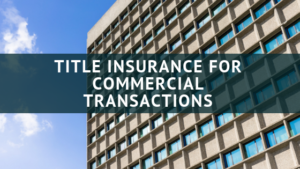Estimated reading time: 3 minutes
Title Insurance for Commercial Transactions

The sale of commercial real estate can be a complex process. Still, title insurance plays an important role in the transaction. While commercial transactions are similar to residential transactions, commercial transactions generally involve a larger financial investment. Complex ownership structures, use, and deeper research are needed to ensure the interests are conveyed properly. Below, we outline the basics of title insurance for commercial transactions.
Title insurance is set up to protect both commercial property buyers and their mortgage lenders. However, the respective base policies each have different terms and coverage.
The lender requires the buyer to purchase title insurance to protect the loan collateral. This loan policy (often called a lender’s policy). It is required by all lending firms as a way to ensure their security interest in the property.
Additionally, commercial real estate buyers also have the option to buy an owner’s policy of title insurance. This provides insurance directly to the insured owner listed in the policy.
Commercial lenders and buyers often seek additional coverages under different title policy endorsements that might be available under appropriate circumstances. Title insurance for commercial transactions protects the policyholders from events or issues that occurred prior to the date of the policy. These fall into four major categories: liens, basic risks, encumbrances, and escrow and closing.
Commercial Title Insurance Category 1: Liens
The priority of the lender’s mortgage or the buyer’s deed in relation to other liens attached to the property, are counted as liens. Mortgages, state or federal tax liens, or court judgments resulting from unpaid loans or unpaid contractor bills. In the commercial setting, such unpaid items can be large and costly in the absence of insurance.
Commercial Title Insurance Category 2: Basic Risks
Next, fraud, forgery, zoning or building permit violations, and incorrect legal descriptions are a few of the basic risks out there. Defects of this kind can be difficult to uncover during the title search and examination. Records may be incomplete or not filed correctly. In commercial transactions, the parties transferring interests upon which policyholders rely are groups with complex ownership structures. A legal defect in the transfer of those interests could impact the priority of the mortgage. In fact, it could also affect the actual ownership of the property!
Commercial Title Insurance Category 3: Encumbrances
Next in line are encumbrances. Encumbrances are defects on the insured title otherwise not excepted in the policy. Missing interests, easements or other recorded rights are classified as an encumbrance. An easement may not affect an owner’s right to own or sell their property. Still, it may limit their use of the property, may affect the property’s value. This is particularly important in the commercial setting.
Commercial Title Insurance Category 4: Escrow and Closing
Lastly, escrow and closing refers to problems due to poor execution of closing documents and improper recordings. In commercial closings, there are often numerous documents to be executed by multiple parties and recorded properly. If the closing of the mortgage or sale transaction was incomplete, it could impact the validity and/or priority of the mortgage or the actual ownership of the property.
Additional Coverage: Uniform Commercial Code
Additionally, if the commercial transaction involves personal property, a Uniform Commercial Code (UCC) Insurance Policy insures additional protection for the buyer and lender.
Conclusion
Finally, if you have any questions about title insurance for commercial transactions, call us at 717-293-9760 or fill out this form. We are here to help!


[…] Title Insurance for Commercial Transactions […]